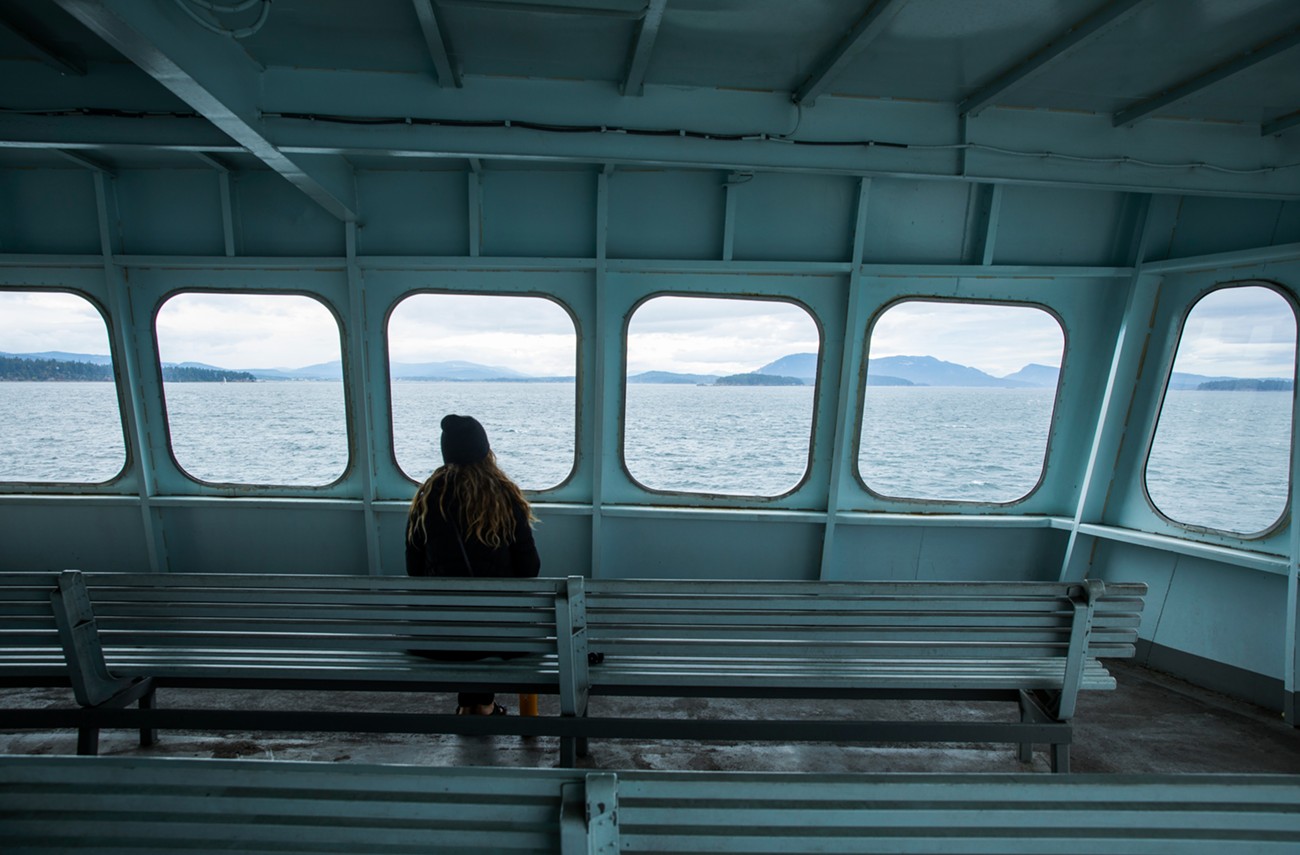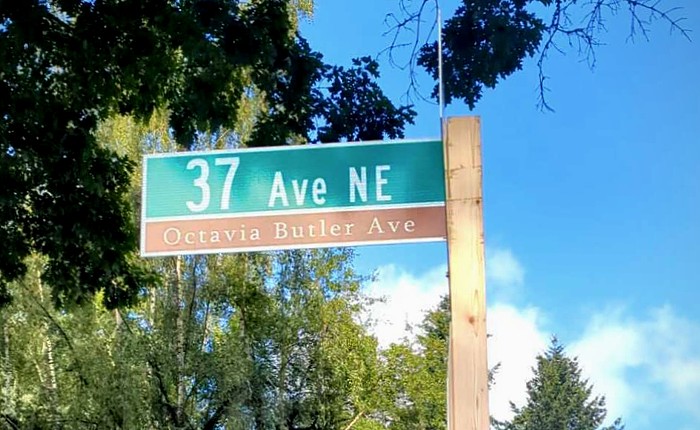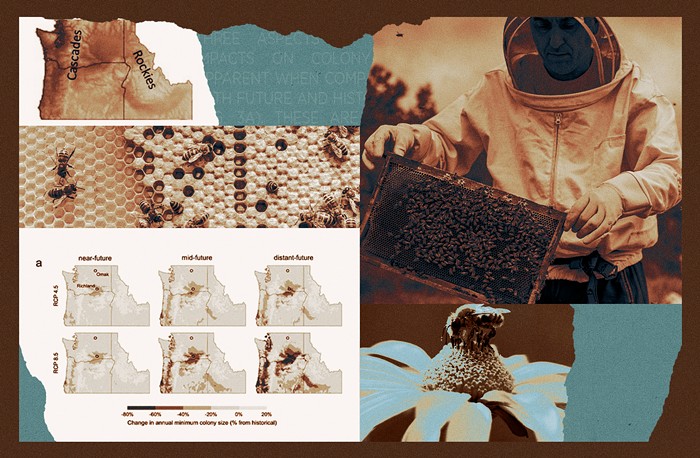An hour before a young man from Bethel Park, Pennsylvania attempted to kill Donald Trump, I learned that the ferry I planned to take from downtown Seattle to Bainbridge was behind by more than an hour. "It still hasn't left Bainbridge," the ticket person said despondently. I looked at the attendant, then at the time on my phone, and soberly concluded that Nikki McClure's 3 pm event at Bainbridge Island Museum of Art was out of my reach. The mess on this side of the bay would certainly be duplicated on the other side.
I decided to change my afternoon plan and visit Pioneer Square, which is across the car-stuffed street from Colman Dock's new NBBJ-designed terminal. This plan, however, turned out to be as messy as the first because the old neighborhood was packed with out-of-towners heading to a Kenny Chesney concert. When news of the attempted assassination of Mr. Big MAGA reached all of us via social media, I decided to get out of Dodge. "It was just one of dem days."
Lol. Washington ferries are always delayed because the state fired a ton of unvaccinated workers. But you know what will fix it? Diversity!
— Jason Rantz on KTTH Radio (@jasonrantz) March 2, 2023
How does diversity make ferries run better? Diversity! But how? Diversity! pic.twitter.com/xLSK0Xxril
But was it really just one of those days? If we go back to the morning of July 13, a good question to ask is: What planet was I on? Certainly not one where you could stop reading a book at 11 am, dress by noon, be at Colman Dock by 1 pm, arrive at Bainbridge by 2 pm, and watch Nikki McClure do her thing at 3 pm. It was naive of me to believe crossing the bay would go like clockwork. I should have known better. A day doesn't seem to go by without a local news site running a story ("WA ferry workers bear brunt of delayed, angry passengers") about how unreliable ("Ferry riders frustrated over continuing delays and cancelled routes") the largest and one of the busiest ferry systems in the US has become. I should have been up on things.
Nevertheless, many reasons have been offered for this sad state of affairs, but in truth, there is only one reason for the present crisis. It's not the firing of "unvaccinated workers," or the governor's plan to pull ferries off of catastrophic fossil fuels and plug them into cleaner energy. It all begins with Tim Eyman generally, his Initiative 695 specifically, and the drivers of Washington State directly. In 1998, 56% of voters decided that no relation existed between taxes and the cost of maintaining the most expensive form of mass transportation, the car. As a consequence, the ferry system, which basically provides floating/motion bridges for automobiles, was dealt a blow from which it has never recovered.
This is a simple fact. The then-"most feared man in Washington state politics" spoke to voters/drivers, and they, for the most part, ate it all up: taxes do nothing but give useless government bureaucrats more cheese than they really need, taxes are unconstitutional, taxes put freedom in a cage, and so on and so on. Once the fact of Initiative 695's impact is appreciated, we can make the next move, which will throw light on the nature and structure of the society (capitalist) that makes sense of our lives from the cradle to the grave.
Now, I want to take us to Los Angeles, to the "City of Angels" that 10,000 Maniacs hated on in a 1987 tune, to the city the filmmaker Thom Andersen investigated in the excellent documentary Los Angeles Plays Itself. Recall that in Plays Itself, Andersen revealed that the conspiracy at the heart of the movie Chinatown, the evil conspiracy to control the city's water, had no relationship whatsoever with the historical record. A daughter-fucking rich man did not raw-dog the public. Sorry for being so blunt. Instead, the city's foundational water issue was, despite a conspiracy, presented to voters in an orderly fashion, and the public voted to fuck over "farmers, ranchers and other residents living in Owens Valley" by directing that region's river to the city. This is actually what happened with our ferry system. The voters, as with LA's water system, are at the bottom of this story.
In fact, the usual villains of a scenario of this kind, major corporations, were openly opposed to Tim Eyman's initiative. Slate, from that year:
One peculiar thing about the Washington tax revolt is that taxes are relatively mild out here. There is no state income tax, property taxes rank 19th (as of 1996), and the average sales tax is about 7.5 percent. So what started as a revolt against an unpopular tax turned into a referendum on disingenuous politicians–and their allies. Microsoft, Boeing, Weyerhaeuser, labor, and virtually every editorial page in the state opposed I-695, portraying it in hyperbolic, apocalyptic colors. The political, corporate, and union establishments put their money where their mouths were, too, dropping $2.1 million to fight the measure, outspending the tax rebels by 10-to-1.
On top of that, the Washington State Supreme Court rejected I-695 after it passed, but a Democratic governor, Gary Locke, resurrected it ("the will of the people"), and made it a reality. Permanent Defense:
Despite opposition from a bipartisan coalition, I-695 easily passed. It was struck down as unconstitutional due to having multiple subjects in early 2000, a decision that was later affirmed by the Washington State Supreme Court. Following the court decision, Governor Gary Locke and the Legislature capitulated to Eyman by repealing the statewide MVET, eviscerating billions in funding for essential public services like Washington State Ferries.
And so it is. And by the looks of things, so it will be again. Voters are again being asked to support, in November, an initiative that would cut an important post-Initiative 695 source of funding for Washington State Ferries. This is Initiative 2117, which would "Prohibit Carbon Tax Credit Trading and Repeal Carbon Cap-and-Invest Program." It's also called a "hidden gas tax" by its supporters. Its opponents, which include corporations like Amazon and Microsoft, very well know that the carbon tax is not a gas tax and, more importantly, if the initiative is passed, it will throw Washington State Ferries into more fusion.
What are we to make of this development, and its lack of obvious villains? The same goes for the recent rejection in California of a proposition that would have permitted the state to borrow "$9 billion for water infrastructure improvement." Clean water for the people was in this proposition; the state suffers "from chronic water scarcity." Who is the villain here? Certainly not a Noah Cross. Big agriculture (meaning, big business) actually backed the proposition. The answer is found in a theory that needs more attention. Moishe Postone presented it in his book Time, Labor, and Social Domination, which was published not long after the fall of the Berlin Wall and the collapse of the USSR.
The fact of the matter is that capitalism—not labor or rich people or democracy—is the one and only subject of capitalism. What Postone's highly theoretical assertion explains is precisely the kind of contradiction that occurred in Washington on November 2, 1999, and will likely occur again on November 5, 2024. True, capitalism benefits the rich (the Noah Crosses of the world) for the most part, but capitalism is successful, is still with us, and will be with us for the foreseeable future, because it's autonomous and impersonal. It, in the words of Postone, "operates behind the backs of [all] the social actors." This, as I said at the beginning of the post, is something to really think about.



















